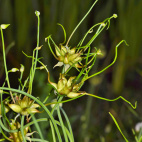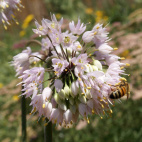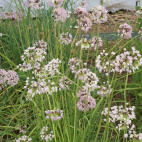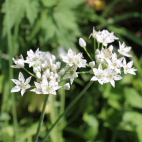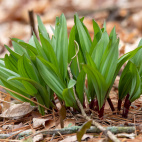Prairie Onion Seeds
Allium stellatum
- HOW TO GROW
- FAST FACTS
HOW TO GROW
Sowing: For most efficient growth, plant Prairie Onion Allium Stellatum seeds in the fall; the seed will remain dormant until early spring. Nodding Onion can also be direct sown in early spring, after the seeds have been refrigerated for 60 days. To start indoors, keep the seed in the refrigerator for 60 days then plant 2-3 Prairie Onion Allium Stellatum seeds each in individual pots. Keep the soil lightly moist and the temperature around 60 degrees F until germination. Germination may be slow.
Growing: Keep young seedlings moist until they become established. This plant adapts well to almost any soil and can survive in shade, clay, or rocky soil. Mature plants tolerate drought very well and do not often need watering. If excess moisture remains in the soil, the bulb may rot. These plants benefit from being divided every third year, or when the clump expands to 8-10 plants. New plants grow easily from transplanted bulbs. The plant also self sows easily; to prevent this, remove blossoms as soon as they fade. As well as repelling deer, rodents, and harmful insects, this plant attracts butterflies, bees, and hummingbirds.
Harvesting: Though the bulbs of this plant do not have much culinary value, every part of the plant can be eaten; the flavor is quite strong, and is best used in moderate amounts or as a flavoring. Both the leaves and flowers have a strong onion flavor and can be used in fresh salads, entrees, or as a garnish.The leaves can be cut any time after they reach a size of 6". The flowers have the strongest flavor at the height of their maturity.
Seed Saving: The seed heads develop in early fall, turning pale tan as they mature. When the visible seeds ripen to black, remove the seed heads and spread them out to dry completely. Rub the heads lightly to separate the seed from the pods and store the cleaned Prairie Onion Allium Stellatum seed in a cool, dry place for up to 3 years.
FAST FACTS
Common Names: Wild Onion, Autumn Onion
Latin Name: Allium stellatum
Species Origin: US Native Wildflower
Type: Native Wildflowers
Life Cycle: Perennial
USDA Zones: 3, 4, 5, 6, 7
US Regions: Plains/Texas, Midwest, Northern
Seeds per Ounce: 11,000
Stratification: Cold/Wet for 8 Weeks
Germination Ease: Stratify 8 Weeks
Sunlight: Full Sun, Part Sun
Height: 16 Inches
Color: Pink
Bloom Season: Blooms Late Summer
Uses: Attracts Pollinators, Cut Flowers, Dried Flowers, Deer Resistant
DESCRIPTION

HOW TO GROW
Sowing: For most efficient growth, plant Prairie Onion Allium Stellatum seeds in the fall; the seed will remain dormant until early spring. Nodding Onion can also be direct sown in early spring, after the seeds have been refrigerated for 60 days. To start indoors, keep the seed in the refrigerator for 60 days then plant 2-3 Prairie Onion Allium Stellatum seeds each in individual pots. Keep the soil lightly moist and the temperature around 60 degrees F until germination. Germination may be slow.
Growing: Keep young seedlings moist until they become established. This plant adapts well to almost any soil and can survive in shade, clay, or rocky soil. Mature plants tolerate drought very well and do not often need watering. If excess moisture remains in the soil, the bulb may rot. These plants benefit from being divided every third year, or when the clump expands to 8-10 plants. New plants grow easily from transplanted bulbs. The plant also self sows easily; to prevent this, remove blossoms as soon as they fade. As well as repelling deer, rodents, and harmful insects, this plant attracts butterflies, bees, and hummingbirds.
Harvesting: Though the bulbs of this plant do not have much culinary value, every part of the plant can be eaten; the flavor is quite strong, and is best used in moderate amounts or as a flavoring. Both the leaves and flowers have a strong onion flavor and can be used in fresh salads, entrees, or as a garnish.The leaves can be cut any time after they reach a size of 6". The flowers have the strongest flavor at the height of their maturity.
Seed Saving: The seed heads develop in early fall, turning pale tan as they mature. When the visible seeds ripen to black, remove the seed heads and spread them out to dry completely. Rub the heads lightly to separate the seed from the pods and store the cleaned Prairie Onion Allium Stellatum seed in a cool, dry place for up to 3 years.
FAST FACTS
Common Names: Wild Onion, Autumn Onion
Latin Name: Allium stellatum
Species Origin: US Native Wildflower
Type: Native Wildflowers
Life Cycle: Perennial
USDA Zones: 3, 4, 5, 6, 7
US Regions: Plains/Texas, Midwest, Northern
Seeds per Ounce: 11,000
Stratification: Cold/Wet for 8 Weeks
Germination Ease: Stratify 8 Weeks
Sunlight: Full Sun, Part Sun
Height: 16 Inches
Color: Pink
Bloom Season: Blooms Late Summer
Uses: Attracts Pollinators, Cut Flowers, Dried Flowers, Deer Resistant
Also Consider These:
-
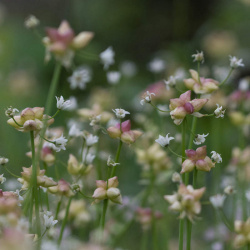 On Sale!
Wild Garlic Seeds
Allium canadense
Quick View
x
On Sale!
Wild Garlic Seeds
Allium canadense
Quick View
xWild Garlic Seeds
Allium canadense
This native herb has been valued for centuries for both its culinary and medicinal excellence. Both the leaves and flowers have an excellent mild flavor for use in fresh salads, entrees, or as a garnish. It also flowers with the distinctive globe-shaped allium blooms. The small bulblets that we offer here are the best way to get them started.
Starting at $3.48 USD -
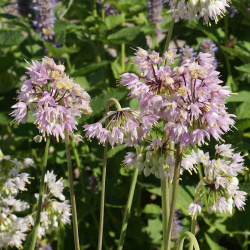 Nodding Onion Seeds
Allium cernuum
Quick View
x
Nodding Onion Seeds
Allium cernuum
Quick View
xNodding Onion Seeds
Starting at $3.48 USD -
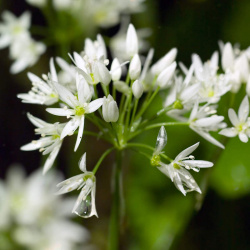 Wild Leek Seeds
Allium tricoccum
Quick View
x
Wild Leek Seeds
Allium tricoccum
Quick View
xWild Leek Seeds
Starting at $3.75 USD






